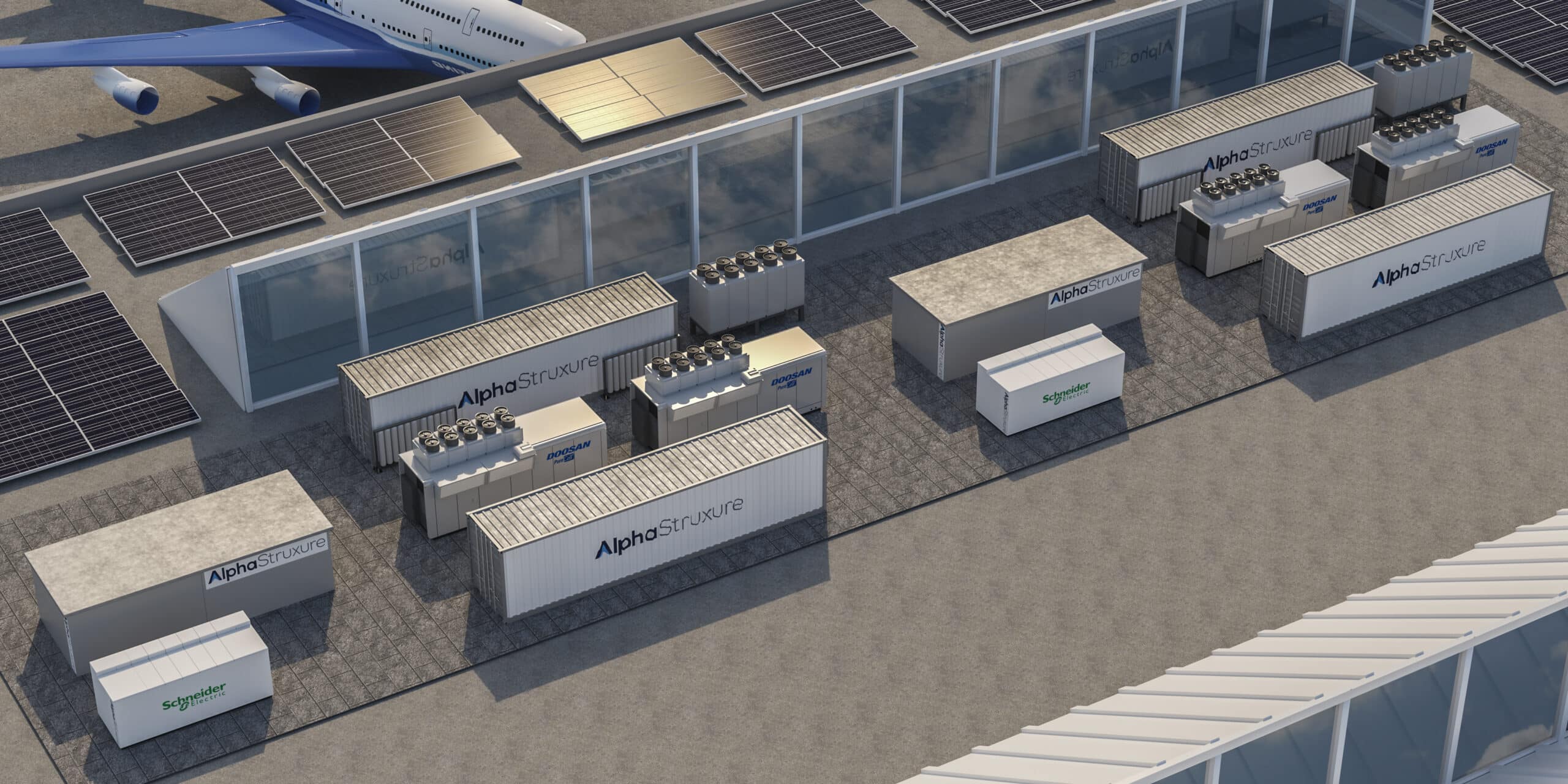- Montgomery County, Maryland’s David F. Bone Equipment Maintenance and Transit Operations Center will be the largest renewable energy-powered transit depot, the largest transit depot microgrid in the nation, and the first on the East Coast to produce green hydrogen on-site.
- This 5.65 megawatt microgrid project, delivered for zero upfront costs via Energy as a Service, will feature solar arrays, electric bus chargers, battery energy storage, and a County-owned hydrogen electrolyzer, thereby allowing the depot to operate indefinitely in “island mode.”
- Event photos, 3D renderings, B-roll and other media assets can be found here
DERWOOD, Md., June 14, 2024 — Today, AlphaStruxure, a leader in Energy as a Service (EaaS) microgrid solutions, and Montgomery County, Maryland (County) broke ground on an integrated microgrid infrastructure project. The project will feature electric bus charging and on-site green hydrogen production powered by solar and battery energy storage.
The County operates the second-largest bus fleet in the Washington, D.C. region. Its David F. Bone Equipment Maintenance and Transit Operations Center is a major depot within Ride On Montgomery’s network and the fifth largest County-owned energy consumer. By 2035, the depot is projected to accommodate 200 zero-emissions buses, of which most will be hydrogen fuel cellNew electric buses (FCEBs). The County is using FCEBs in part because they have a greater range versus battery electric buses and can thus support longer bus routes. A hydrogen FCEB is a zero-emissions vehicle, powered by hydrogen and oxygen, emitting only water.
The microgrid’s construction is expected to be completed in 2025, when the system will begin sending renewable energy back to the grid and have the ability to power zero-emissions buses. This microgrid follows the launch of the Brookville Smart Energy Bus Depot in 2022, which was the County’s first fully constructed microgrid-powered bus depot and also led by AlphaStruxure. Together, the two depots will eventually power about 335 zero-emissions transit buses, according to the County’s latest fleet transition plan.
“It’s a joyous moment to be breaking ground on a project that is the new standard for public transit in the United States,” said Juan Macias, CEO of AlphaStruxure. “The County has proven itself as a national leader in zero-emissions transit, in part by prioritizing simultaneous procurement of both the buses and the sustainable infrastructure needed to power them. Both are fundamental to a successful fleet transition. Our Energy as a Service approach enables the County to achieve sustainable and resilient transit — without upfront capital, in a way that de-risks the financial, construction, and operations phases of the project.”
“This project is the largest renewable energy-powered transit depot and transit depot microgrid in the nation; it is also the first facility on the East Coast to produce green hydrogen on-site,” said County Executive Marc Elrich. “Montgomery County is providing a sustainable model for the nation to follow. It is great to see this bus depot microgrid move from concept to construction so quickly thanks to our ongoing partnership with AlphaStruxure and their related companies; we already have five microgrids in operation or development, with more underway. This project will both ensure that County services are prepared for the increasingly extreme weather due to climate change as well as increasing our production of clean energy.”
“Transitioning to green transit is better for our commuters and the health of our communities. That’s why I worked to secure funding to support Montgomery County’s efforts to move to a fully zero-emission bus fleet fueled by renewable power,” said U.S. Senator Chris Van Hollen. “Projects like these are critical to achieving Maryland’s ambitious clean energy goals while making local public transit more reliable and cost-effective.”
“By breaking ground on America’s largest electric bus depot, Montgomery County continues to lead the country with investments in creating a clean energy future for our children and grandchildren,” U.S. Representative Jamie Raskin said. “I’m confident this project will serve as an inspiration for other local governments exploring sustainable energy transitions, and I’m committed to continue strongly advocating for commonsense pro-climate legislation in Congress to benefit Maryland and the nation.”
Fueling the County’s FCEBs with green hydrogen produced by the microgrid’s solar array advances the County’s goal of reaching a 100% reduction in carbon emissions by 2035. The microgrid also enables the County to reduce its Scope 1 and 2 emissions by 4,000 metric tons of CO2 per year, equivalent to approximately 780 homes’ annual electricity use. The County will also use the microgrid to advance equity. The microgrid will support zero-emissions buses for cleaner air and less congestion along its Bus Rapid Transit (BRT) network, which serves many minority and low-income riders. It will also support new career and training opportunities for underserved communities through a County apprenticeship program.
Like the Brookville depot, this existing depot will remain fully operational throughout its 28-phase construction process, with no impact on transit services. The microgrid will provide sustainable, resilient power to a mixed fleet of battery electric and FCEBs, along with the facility’s five buildings. It will also be interconnected to the Pepco utility grid and is engineered to operate in island mode indefinitely, ensuring uninterrupted service for the County’s constituents during extended grid or power outages and emergency situations. Specifically, the microgrid will include:
- 5.65 MWDC of rooftop and canopy solar generation
- 2 MW/6.88 MWh battery energy storage
- Up to 2.25 MW of charging capacity
- 1 MW hydrogen electrolyzer
- Software tools and IoT-connected hardware
- A complete overview can be found here.
AlphaStruxure and the County will leverage a close partnership with the local utility, Pepco, to deploy the large-scale microgrid on a rapid timeline. In addition to powering on-site production of green hydrogen, a resilient fuel source for FCEBs, the microgrid will also be able to send up to two megawatts (MWs) of renewable energy back to the utility grid via a Pepco net metering program.
“Because of their ability to accelerate adoption of clean power sources, microgrids are emerging as a key driver of the energy transition,” said Jana Gerber, Schneider Electric’s President of North America Microgrids. “And as extreme weather increases, a microgrid’s ability to withstand these events is critical for municipalities that need to deliver services to constituents around the clock. Schneider Electric is very proud to contribute to the key infrastructure of this benchmark project that further establishes Montgomery County’s leadership in microgrid and Energy as a Service adoption. The County continues to lead the way and show what is possible.”
AlphaStruxure, a joint venture of Carlyle and Schneider Electric™, will finance the project through the Energy as a Service (EaaS) business model. The Boston, MA-based company will deliver all aspects of design, construction, and long-term operations and maintenance. As a joint venture, AlphaStruxure combines Carlyle’s comprehensive financial capabilities and infrastructure expertise with Schneider Electric’s leading microgrid technology, software, and services.
AlphaStruxure serves as a trusted partner for the County, helping it to achieve its 2035 fleet sustainability and resilience goals. It is delivering the microgrid to the County without requiring capital expenditures via an EaaS contract, a long-term agreement ensuring predictable operating expenses, performance, and energy pricing.
Montgomery County’s Department of General Services, the Department of Transportation, and the Office of Energy and Sustainability are spearheading this ambitious drive toward achieving net-zero emissions by leading the transition of the County’s transit fleet and depot infrastructure. AlphaStruxure’s partners for this project include Mortenson for design-build; Schneider Electric for the battery energy storage system, microgrid controls, switchgear, and services; WSP as the engineer of record; AZZO for network and cybersecurity; The Mobility House for charge management software; and Heliox for EV charger hardware.
About AlphaStruxure
AlphaStruxure is a leading Energy as a Service (EaaS) provider and microgrid integrator. Its purpose is to decarbonize energy infrastructure at speed and scale. It does so by helping public- and private-sector organizations achieve ambitious, tailored energy transformations — without the CapEx or complexity. AlphaStruxure designs, finances, builds, owns, operates and maintains energy infrastructure, including microgrids, to deliver emissions reductions, reliability, and resilience. Its projects include two of the largest transit microgrids in the U.S. and a microgrid for John F. Kennedy International Airport’s New Terminal One. Unlike other EaaS providers, AlphaStruxure owns its clients’ systems for the entire lifecycle, making the company accountable to long-term guarantees on pricing and performance. AlphaStruxure’s joint-venture model harnesses Carlyle’s expertise in financing large-scale energy infrastructure projects and Schneider Electric’s 185+ year legacy of energy innovation, with more than 350 successful microgrid projects across North America. AlphaStruxure is based in Boston, Massachusetts, operates across North America, and leverages global capabilities. Learn more about the company at alphastruxudev.wpengine.com and follow the company on LinkedIn.


